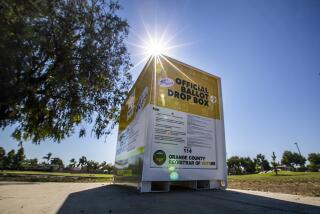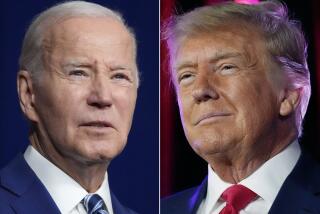Ballot Rules Feed Ethnic Divisions
- Share via
SARAJEVO, Bosnia-Herzegovina — When Bosnians go to the polls in three weeks to elect their first postwar leaders, they can vote where they live. Or they can vote where they used to live. They can even vote where they say they intend to live.
This anomaly in the election rules is defended by international organizers as an example of the extraordinary measures being taken to make it possible for a country of refugees to vote. But nationalist leaders who waged the war and now stand to win the elections have exploited the provision to their own ethnic advantage.
In what critics call election ethnic engineering, Bosnian Serb leaders have encouraged or coerced Bosnian Serb refugees to vote in towns that were Muslim until the Bosnian Serb army “cleansed” them during the war. That way, the towns will have majority Serbian voters, consolidating Bosnia’s ethnic division and undermining the international community’s stated goal of a unified Bosnia-Herzegovina.
According to the rules, it doesn’t matter if those voters have never before set foot in the towns where they vote.
Bosnia’s Muslim leaders pulled a similar stunt. They resettled thousands of Muslim refugees, many from the fallen “safe area” of Srebrenica, in homes around Sarajevo belonging to Serbs, kicking out Serbs in the process.
This gives the Muslim party of President Alija Izetbegovic a solid voting base against any candidates attempting to break the rulers’ tight grasp on power.
Questionable rules and registration practices that monitors concede border on fraud are only part of an increasingly dismal picture of electoral preparations that casts doubt over the fairness and reliability of the Sept. 14 poll.
By most accounts, few conditions for a democratic exercise exist, and the Organization for Security and Cooperation in Europe, or OSCE, the Western agency overseeing the campaign and voting, has been widely criticized for its failure to enforce its own minimum standards.
Opposition parties have little access to the media, there is little freedom of movement for the displaced who want to return home, and as recently as a few days ago indicted war crimes suspects continued to grace campaign posters in Republika Srpska--the Serbs’ portion of Bosnia--in violation of campaign rules.
Opposition candidates in Muslim, Serbian and Croatian regions have faced intimidation, sometimes from their own ethnic brethren. In the northwestern areas of Bihac and Cazin, for example, candidates (some of them Muslim) have been subjected to systematic threats and violence said to be the work of Muslim government agents. Eight bombs exploded at the homes of opposition candidates in the past week, U.N. police monitors said.
The Clinton administration is keen for the elections to take place on schedule, largely because the withdrawal of most U.S. troops that form part of the peacekeeping force depends on it.
Skeptics fear the elections will reinforce ethnic segregation and place the country back on the tense, tenuous footing of 1992, when an election cleaved the country and led to war.
All voters in Bosnia will be able to cast ballots for a three-person presidency, although voters in Republika Srpska will choose from among Bosnian Serb candidates and those in the Muslim-Croat half of the country will choose among Muslim and Croatian candidates. The top vote-getter in each ethnic group will be elected to the presidency.
Commanders of the North Atlantic Treaty Organization-led peacekeeping force, meanwhile, fear violence on election day. Many displaced Bosnians are expected to try to cross ethnic lines to vote. NATO will print and transport ballots and guard routes laid out for voters.
Slightly more than 640,000 Bosnians living abroad have registered to vote--including about 120,000 in Serbia, most of whom are Serbs.
(BEGIN TEXT OF INFOBOX / INFOGRAPHIC)
Building a New Government
Bosnian voters on Sept. 14 will jointly elect a three-member presidency and a House of Representatives. Separately, Muslim-Croats, left column, and Serbs, right, will select members of their own governing bodies.
The three-member presidency of Bosnia-Herzegovina
House of Representatives of Bosnia-Herzegovina
****
Muslim-Croats
House of Representatives of the Federation
Cantonal assemblies
Municipal assemblies
People of the Federation of Bosnia-Herzegovina
****
Presidency of Republika Srpska
National Assembly of Republika Srpska
Municipal assemblies
People of Republika Srpska
More to Read
Sign up for Essential California
The most important California stories and recommendations in your inbox every morning.
You may occasionally receive promotional content from the Los Angeles Times.














